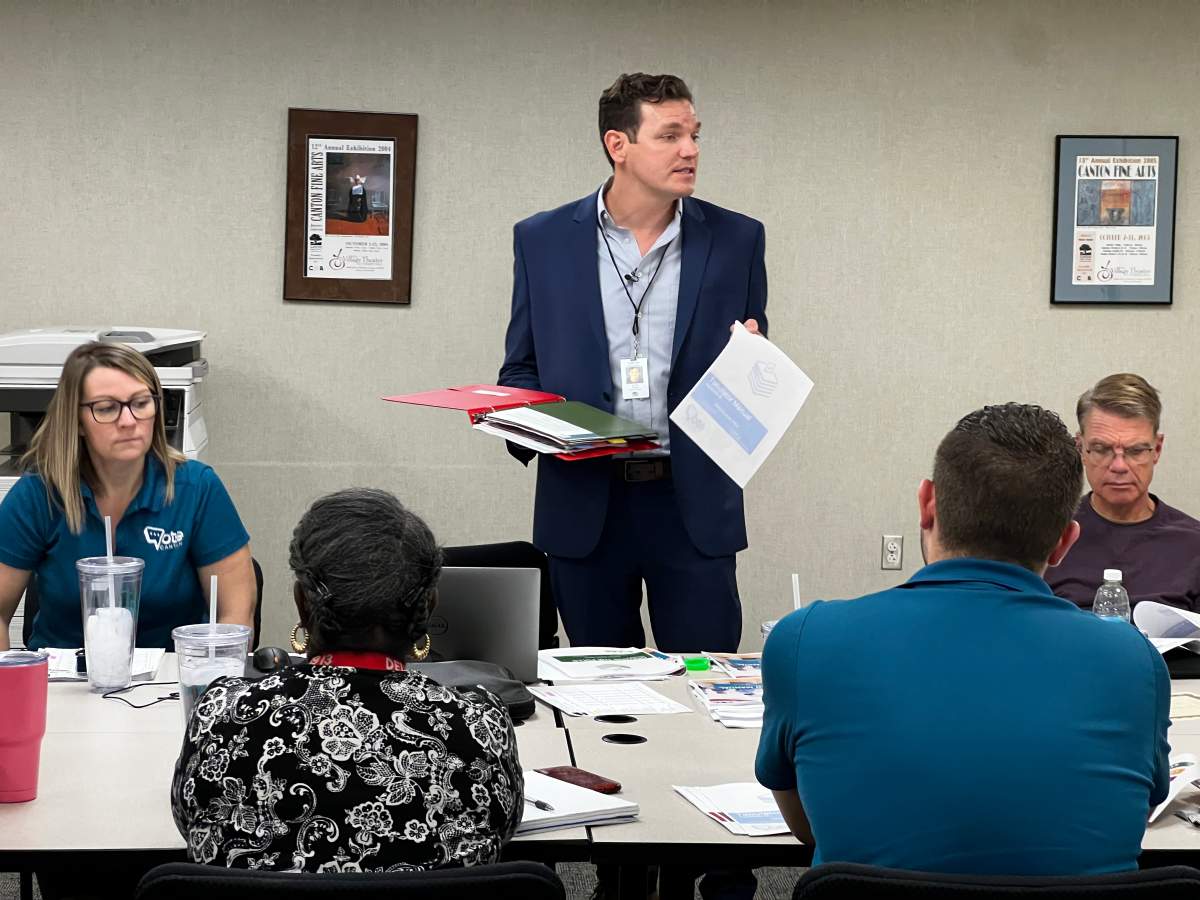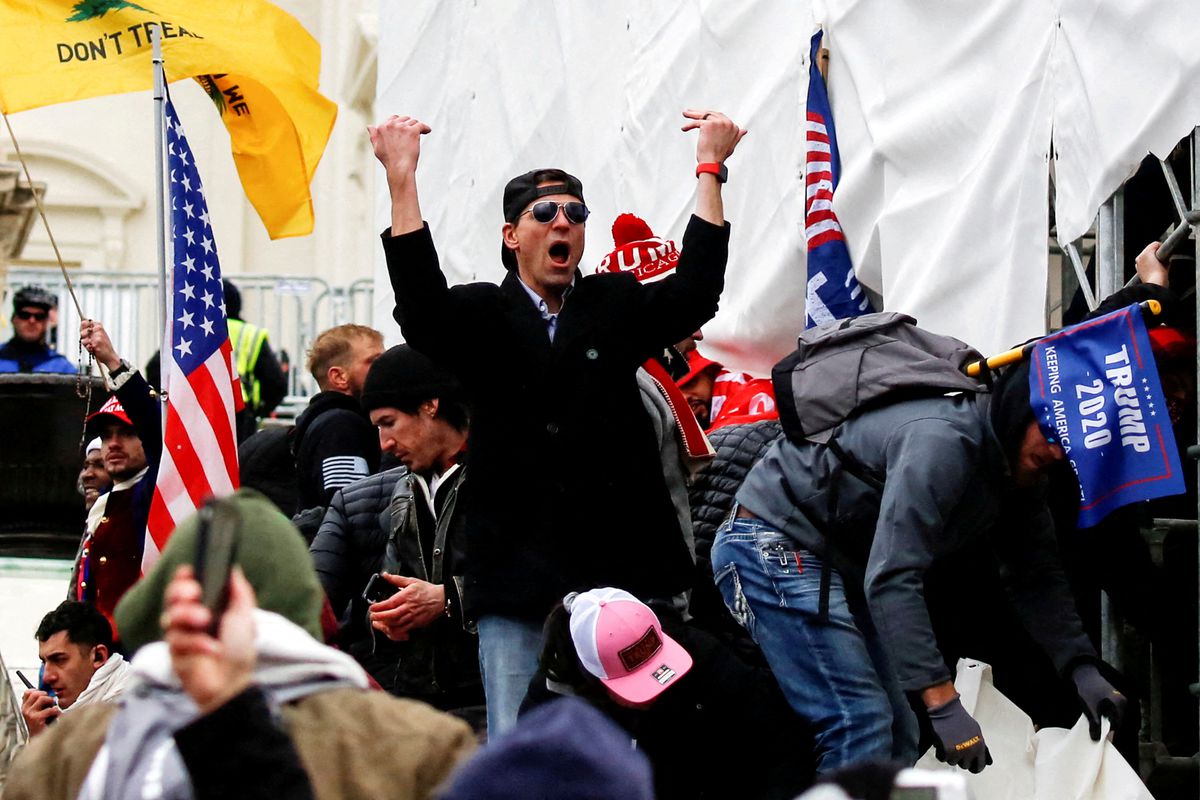Ten election inspectors sit around a table in the basement of the Clerk’s office in Canton, Michigan, learning de-escalation techniques. The building itself has been upgraded with new security measures, and four police officers are now assigned to patrol the township’s 12 polling locations on Midterm Election Day.

“Since 2020, emergency planning and security planning has been a key function of election planning. That was not the case prior, but it is the case now,” said Canton Clerk Michael Siegrist, who recently published a manual for maintaining order on Election Day.
Siegrist, a Democrat, is one of many Americans from across the political spectrum who see the midterms on Nov. 8 as a crucial test for American democracy. And they’ve spent the past two years preparing for a fight.
“Since 2020, there are people who have been out there doing push-ups, getting stronger, doing everything they can to try to understand the system for the sole purpose of probing it for weaknesses,” Siegrist told Global News. “We used to only receive that from foreign governments.”
Siegrist’s Canton Township is just a short drive from Detroit, which has become the epicentre of conspiracy theories around election fraud. On Nov. 5, 2020, one day after the last U.S. presidential election, angry crowds answered Donald Trump’s call to “stop the count” by forcing their way into Detroit’s TCF convention centre where poll workers were counting the ballots.
“There was an influx of people that came in that had no (elections) training and were very ginned up on trying to stop things,” said Chris Thomas, who was working as an elections supervisor at the TCF Centre. “They’re banging on windows and yelling at the workers. So we had a bit of a chaotic time.”
Thomas, 73, has dedicated his life to elections integrity. He spent nearly four decades leading the elections division in the office of Michigan’s secretary of state, serving under Republicans and Democrats alike and forging a reputation as a nonpartisan elections expert.

Get breaking National news
He retired in 2017 but was asked to return on a special assignment in 2020, amid the COVID-19 pandemic and President Trump’s warnings of a Democratic plot to steal the election. Thomas will be coming out of retirement again on Nov. 8 to help protect the process from “election deniers.”
“It’s a huge concern,” Thomas said. “It’s a real movement. It’s substantial and they’re vocal and some of them are pretty clever on what they’re trying to do.”
Various “Stop the Steal” groups, which sprung up in the wake of the 2020 election, have encouraged supporters to organize armed stake-outs at dropbox voting locations. They’ve also held training sessions for official “poll watchers” and “poll challengers” with instructions to secretly and illegally take videos and photos inside polling locations.
“It’s not just the Republican Party and Democratic Party that have (poll) challengers,” Thomas said. “There are other groups, some of them are Republican factions that will have challengers present. And they’re harder to deal with. They’re convinced that the voting system stole the election and will do it again. And they are a lot more aggressive.”
Ryan Kelley was among the “Stop the Steal” protesters at the TCF Centre in Detroit in 2020. The former GOP gubernatorial candidate for Michigan was later charged with misdemeanours in connection with the Jan. 6, 2021, US Capitol riot. He has pleaded not guilty to the charges.
“There’s a huge push for election workers, poll challengers, understanding election laws so that we’re not taken off guard,” Kelley said regarding the upcoming midterms.
When asked by Global News whether he still believes the 2020 election was stolen, Kelley was unequivocal. “Of course it was. Absolutely. The 2020 election was stolen,” he replied.
Trump lost Michigan by 154,000 votes. The result was confirmed by more than 250 state and local audits, as well as a Republican-led state Senate report that “found no evidence of widespread or systematic fraud.”
But like Kelley, many Republican candidates running for national or statewide office have made “stop the steal” electoral fraud claims into central themes of their political campaigns. In some cases, these candidates are running for offices — like secretary of state — that would help oversee future elections.
In Michigan, election denier Kristina Karamo is the Republic candidate for secretary of state. She worked as a poll challenger in Detroit in 2020 and rose to prominence after questioning the legitimacy of Michigan’s election, claiming without evidence that she witnessed fraud at Detroit’s absentee counting board. Her claims landed her interviews on national conservative talk shows and an endorsement from former President Trump.
Karamo, a former community college instructor, has made headlines for previously likening abortion to child sacrifice and claiming same-sex relationships reflect society’s “sexual brokenness.”
Her campaign did not respond to a request from Global News for an interview, but her website says Karamo, as secretary of state, intends on “securing chain of custody” throughout the voting system. That includes requiring every voting software and hardware manufacturer to “turn over all source and/or object codes” to her administration.
Michigan’s Republic candidates for Attorney General and Governor also deny the results of the 2020 election. If elected, they would have the power to change the rules for future elections. The secretary of state also has the power to refuse to certify accurate election results, which would set off litigation in state and federal court.
“And so that’s how the whole system starts to degrade,” said Thomas. The veteran bipartisan election official told Global News he fears candidates will introduce rules aimed at voter suppression under the guise of election integrity.
“It’s not like it’s going to be a coup with tanks in the streets or any of that. It’s going to be one of these things you wake up to some day, and you realize that the laws that have been enacted, the barriers that have been set up, the people now running elections, really believe and make you believe in what may today be just conspiracies.”














Comments
Want to discuss? Please read our Commenting Policy first.